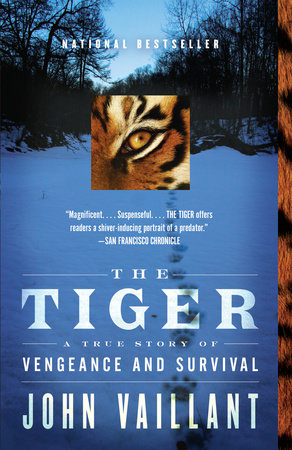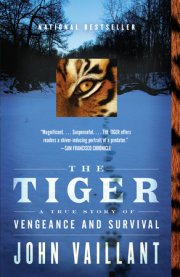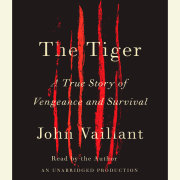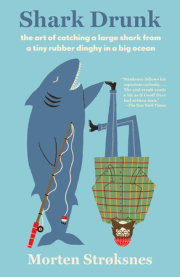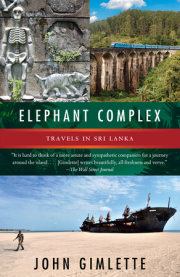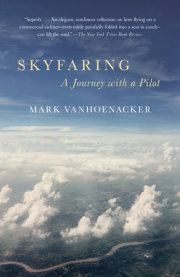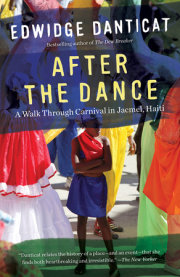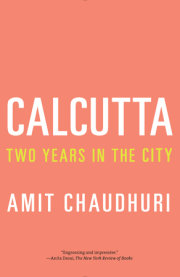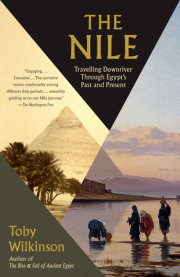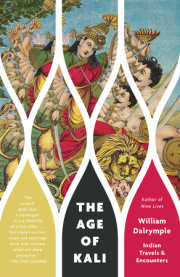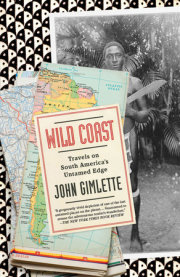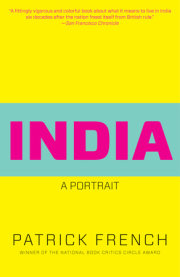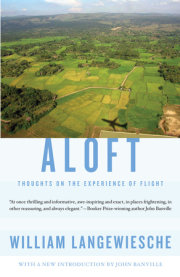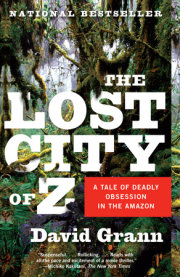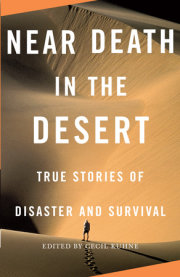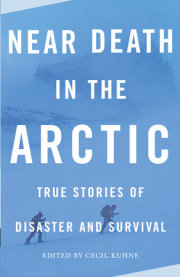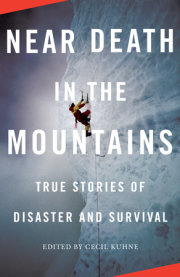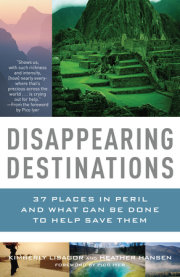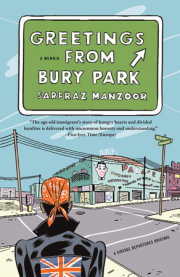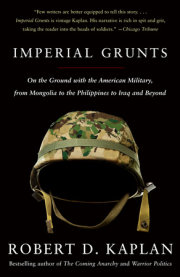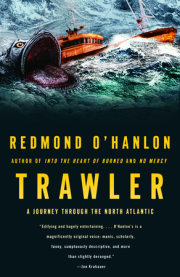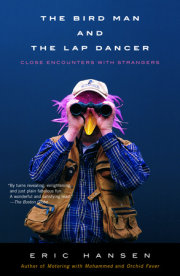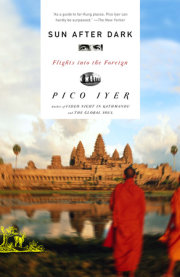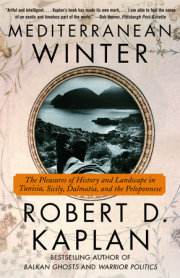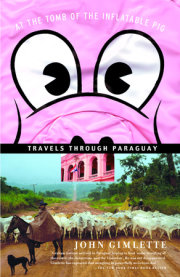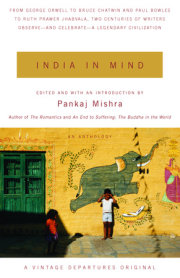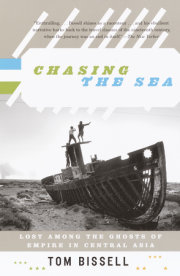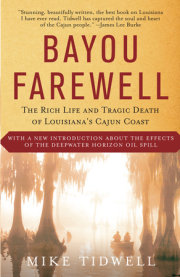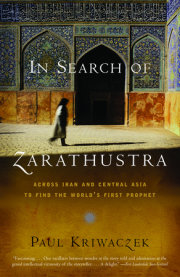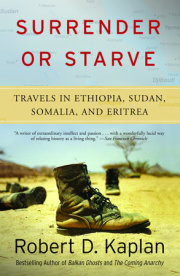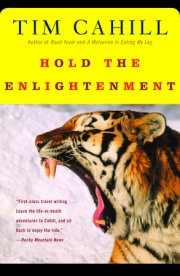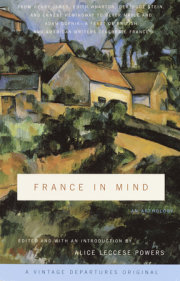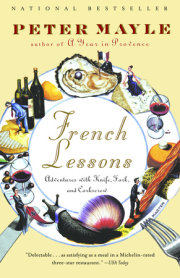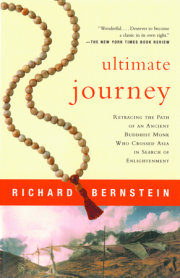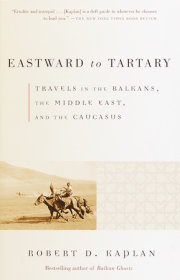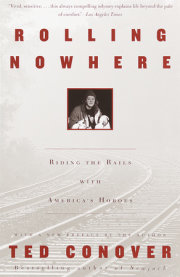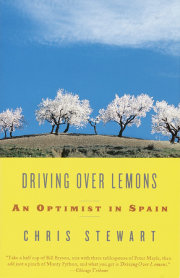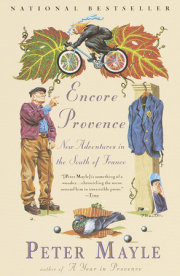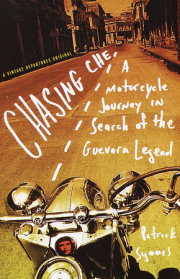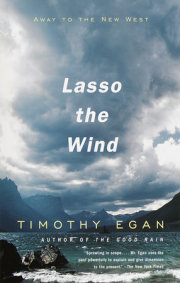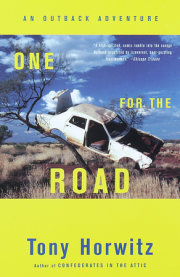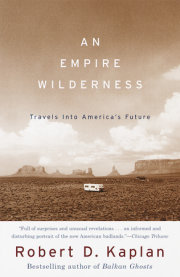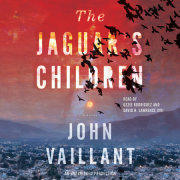Prologue
HANGING IN THE TREES , AS IF CAUGHT THERE, IS A SICKLE OF A MOON.
Its wan light scatters shadows on the snow below, only obscuring further the forest that this man negotiates now as much by feel as by sight. He is on foot and on his own save for a single dog, which runs ahead, eager to be heading home at last. All around, the black trunks of oak, pine, and poplar soar into the dark above the scrub and deadfall, and their branches form a tattered canopy overhead. Slender birches, whiter than the snow, seem to emit a light of their own, but it is like the coat of an animal in winter: cold to the touch and for itself alone. All is quiet in this dormant, frozen world. It is so cold that spit will freeze before it lands; so cold that a tree, brittle as straw and unable to contain its expanding sap, may spontaneously explode. As they progress, man and dog alike leave behind a wake of heat, and the contrails of their breath hang in pale clouds above their tracks. Their scent stays close in the windless dark, but their footfalls carry and so, with every step, they announce themselves to the night.
Despite the bitter cold, the man wears rubber boots better suited to the rain; his clothes, too, are surprisingly light, considering that he has been out all day, searching. His gun has grown heavy on his shoulder, as have his rucksack and cartridge belt. But he knows this route like the back of his hand, and he is almost within sight of his cabin. Now, at last, he can allow himself the possibility of relief. Perhaps he imagines the lantern he will light and the fire he will build; perhaps he imagines the burdens he will soon lay down. The water in the kettle is certainly frozen, but the stove is thinly walled and soon it will glow fiercely against the cold and dark, just as his own body is doing now. Soon enough, there will be hot tea and a cigarette, followed by rice, meat, and more cigarettes. Maybe a shot or two of vodka, if there is any left. He savors this ritual and knows it by rote. Then, as the familiar angles take shape across the clearing, the dog collides with a scent as with a wall and stops short, growling. They are hunting partners and the man understands: someone is there by the cabin. The hackles on the dog’s back and on his own neck rise together.
Together, they hear a rumble in the dark that seems to come from everywhere at once.
PART ONE
MARKOV
1
There are many people who don't believe this actually happened. They think it's some phantasm of my imagination. But it was real. There are the facts.Yuri Anatolievich Trush
Shortly after dark on the afternoon of December 5, 1997, an urgent message was relayed to a man named Yuri Trush at his home in Luchegorsk, a mid-sized mining town in Primorye Territory in Russia's Far East, not far from the Chinese border. Primorye (Pri-
mor-ya) is, among other things, the last stronghold of the Siberian tiger, and the official on the line had some disturbing news: a man had been attacked near Sobolonye, a small logging community located in the deep forest, sixty miles northeast of Luchegorsk. Yuri Trush was the squad leader of an Inspection Tiger unit, one of six in the territory whose purpose was to investigate forest crimes, specifically those involving tigers. Because poachers were often involved, these included tiger attacks. As a result, this situation-whatever it might entail-was now Trush's problem and, right away, he began preparing for the trip to Sobolonye.
_____
Early the following morning-Saturday-Yuri Trush, along with his squadmates Alexander Gorborukov and Sasha Lazurenko, piled into a surplus army truck and rumbled north. Dressed in insulated fatigues and camouflage, and armed with knives, pistols, and semiautomatic rifles, the Tigers, as these inspectors are sometimes called, looked less like game wardens than like some kind of wilderness SWAT team. Their twenty-year-old truck was nicknamed a Kung, and it was the Russian army's four-ton equivalent to the Unimog and the Humvee. Gasoline-powered, with a winch, four-wheel-drive, and wide waist-high tires, it is a popular vehicle in Primorye's hinterlands. Along with a gun rack and brackets for extra fuel cans, this one had been modified to accommodate makeshift bunks, and was stocked with enough food to last four men a week. It was also equipped with a woodstove so that, even in the face of total mechanical failure, the crew could survive no matter where in the wilderness they happened to be.
After passing through the police checkpoint on the edge of town, the Tigers continued on up to a dirt road turnoff that led eastward along the Bikin River (be-
keen), a large and meandering waterway that flows through some of the most isolated country in northern Primorye. The temperature was well below freezing and the snow was deep, and this slowed the heavy truck's progress. It also allowed these men, all of whom were experienced hunters and former soldiers, many hours to ponder and discuss what might be awaiting them. It is safe to say that nothing in their experience could have prepared them for what they found there.
Primorye, which is also known as the Maritime Territory, is about the size of Washington state. Tucked into the southeast corner of Russia by the Sea of Japan, it is a thickly forested and mountainous region that combines the backwoods claustrophobia of Appalachia with the frontier roughness of the Yukon. Industry here is of the crudest kind: logging, mining, fishing, and hunting, all of which are complicated by poor wages, corrupt officials, thriving black markets-and some of the world's largest cats.
_____
One of the many negative effects of perestroika and the reopening of the border between Russia and China has been a surge in tiger poaching. As the economy disintegrated and unemployment spread throughout the 1990s, professional poachers, businessmen, and ordinary citizens alike began taking advantage of the forest's wealth in all its forms. The tigers, because they are so rare and so valuable, have been particularly hard hit: their organs, blood, and bone are much sought after for use in traditional Chinese medicine. Some believe the tiger's whiskers will make them bulletproof and that its powdered bones will soothe their aches and pains. Others believe its penis will make them virile, and there are many-from Tokyo to Moscow-who will pay thousands of dollars for a tiger's skin.
Between 1992 and 1994, approximately one hundred tigers-roughly one quarter of the country's wild population-were killed. Most of them ended up in China. With financial assistance (and pressure) from international conservation agencies, the territorial government created Inspection Tiger in the hope of restoring some semblance of law and order to the forests of Primorye. Armed with guns, cameras, and broad police powers, these teams were charged with intercepting poachers and resolving a steadily increasing number of conflicts between tigers and human beings.
In many ways, Inspection Tiger's mandate resembles that of detectives on a narcotics detail, and so does the risk: the money is big, and the players are often desperate and dangerous individuals. Tigers are similar to drugs in that they are sold by the gram and the kilo, and their value increases according to the refinement of both product and seller. But there are some key differences: tigers can weigh six hundred pounds; they have been hunting large prey, including humans, for two million years; and they have a memory. For these reasons, tigers can be as dangerous to the people trying to protect them as they are to those who would profit from them.
The territory covered by Yuri Trush's Inspection Tiger unit in the mid-1990s was centered around the Bikin (be-keen) River. You can drive a truck on the Bikin in winter, but in summer it has a languid bayou feel. For many of the valley's jobless inhabitants, the laws imposed by the river and the forest are more relevant than those of the local government. While most residents here poach game simply to survive, there are those among them who are in it for the money.
_____
In 1997, Inspection Tiger had been in existence for only three years; given the state of the Russian economy in the 1990s, its members were lucky to have jobs, particularly because they were paid in dollars by foreign conservation groups. Four hundred dollars a month was an enviable wage at that time, but a lot was expected in return. Whether they were doing routine checks of hunters' documents in the forest, searching suspect cars en route to the Chinese border, or setting up sting operations, most of the people Inspection Tiger dealt with were armed. As often as not, these encounters took place in remote areas where backup was simply not available, and they never knew what they were going to find.
Following perestroika, virtually everything in Russia went on sale, and vast quantities of military ordnance disappeared from local armories. In the course of their raids on the many anonymous hunting cabins that dot the forest here, Trush and his men confiscated plastic explosives, TNT, and 12mm (.50 caliber) machine guns, robbed from armored vehicles. Trush could not imagine what one would do with guns that size in the forest, but the explosives were easier to explain: they were used in creeks to kill fish en masse, or to blow bears out of their dens. The Asian market is less interested in the intact skins or carcasses of bears than it is in their paws and gall bladders; the paws go into soup, and the gall bladders are used for medicinal purposes. In Primorye, in the mid-1990s, life, for man and animal alike, was cheap, and corruption was widespread at every level of government. During these years, Trush made busts involving high- ranking police officers and members of parliament, and these were dangerous enemies for a person to have. Trush, however, was well suited to this work because he is a formidable adversary, too.
Trush stands about six-foot-two with long arms and legs and a broad chest. His eyes are colored, coincidentally, like the semiprecious stone tiger's eye, with black rings around the irises. They peer out from a frank and homely face framed by great, drooping brows. Though frail and sickly as a boy, Trush had grown into a talented athlete with a commanding presence, a deep resonant voice, and an ability to remain composed under highly stressful circumstances. He is also immensely strong. As a young soldier in Kazakhstan, in the 1970s, Trush won a dozen regional kayaking championships for which he earned the Soviet rank Master of Sports, a distinction that meant he was eligible to compete at the national level. It was a serious undertaking: he wasn't just racing against Bulgarians and East Germans. "I was," he said, "defending the honor of the Military Forces of the USSR." In his mid-forties, when he joined Inspection Tiger, Trush won a territory-wide weightlifting competition three years running. This was not the kind of weightlifting one is likely to see in the Olympics; what Trush was doing looks more like a contest devised by bored artillerymen during the Napoleonic Wars. It consists of hefting a kettlebell-essentially a large cannonball with a handle- from the ground over your head as many times as you can, first with one hand, and then the other. Kettlebells are a Russian invention; they have been around for centuries and their use clearly favors the short and the stocky. So it is surprising to see someone as attenuated as Trush, who has the Law of the Lever weighted so heavily against him, heave these seventy-pound spheres around with such apparent ease.
Trush learned to shoot, first, from his father and, later, in the army. He also studied karate, aikido, and knife handling; in these, his rangy build works to his advantage because his long reach makes it nearly impossible to get at him. He is so talented at hand-to-hand fighting that he was hired to teach these skills to the military police. Trush's physicality is intense and often barely suppressed. He is a grabber, a hugger, and a roughhouser, but the hands initiating- and controlling-these games are thinly disguised weapons. His fists are knuckled mallets, and he can break bricks with them. As he runs through the motions of an immobilizing hold, or lines up an imaginary strike, one has the sense that his body hungers for opportunities to do these things in earnest. Referring to a former colleague who went bad and whom he tried for years to catch red-handed, Trush said, "He knows very well that I am capable of beheading him with my bare hands." This tension-between the kind and playful neighbor, friend and husband, and the Alpha male wilderness cop ready to throw down at a moment's notice-energizes almost every interaction. It is under the latter circumstances that Trush seems most alive.
_____
The deeper Trush and his men drove into the forest, the rougher the road became. Once past Verkhny Pereval, their route took them through the snowbound village of Yasenovie, a sister logging community of the same size and vintage as Sobolonye. Here, they picked up a young deputy sheriff named Bush, but his presence on this mission was more formal than practical. Bush was a cop, and tiger attacks were beyond his purview; however, if there was a body, he was required to witness it. With Bush onboard, they trundled on upriver.
It was already afternoon by the time they reached Sobolonye, an impoverished village of unpainted log houses, that at first glance seemed barely inhabited. Gorborukov was behind the wheel, and here he steered the truck off the main road, such as it was, and plunged into the forest on a track wide enough for only a single vehicle. Several inches of new snow had fallen earlier in the week and, as they drove, Trush scanned the roadside for fresh tracks. They were about fifty miles from the nearest paved road and a couple of hard-won miles east of Sobolonye when they crossed a wide and improbably located gravel highway. This road had been conceived during Soviet times as an alternative to Primorye's only existing north-south throughway, which follows the Ussuri River north to Khabarovsk (the same route used by the Trans-Siberian Railway). Despite handling every kind of traffic, including transcontinental freight trucks, the Ussuri road is poorly maintained and only as wide as a residential street; it was also considered vulnerable to Chinese attack. This new highway, though safer, wider, and ruler-straight, was never finished and so it is essentially a highway to nowhere-in the middle of nowhere. The only people who benefit from it now are loggers, poachers, and smugglers- pretty much the only people around who can afford a vehicle. But sometimes tigers use this highway, too.
There is an unintended courtesy in the winter forest that occurs around pathways of any kind. It takes a lot of energy to break a trail through the snow, especially when it's crusty or deep, so whoever goes first, whether animal, human, or machine, is performing a valuable service for those following behind. Because energy-i.e., food-is at a premium in the winter, labor-saving gifts of this kind are rarely refused. As long as the footpath, logging road, frozen river-or highway-is going more or less in the desired direction, other forest creatures will use it, too, regardless of who made it. In this way, paths have a funneling, riverlike effect on the tributary creatures around them, and they can make for some strange encounters.
The last three miles of the journey were on a logging track so tortuous and convoluted that even a veteran Russian backcountry driver is moved to shout, in a torrent of fricatives and rolling Rs, "Paris- Dakar! Camel Trophy!" It contoured east through the rolling woods, crossing creeks on bridges made of log piles stacked at right angles to the road. Two miles short of a privately owned logging camp, Gorborukov took an unmarked turn and headed north. After a few minutes, he pulled up at a clearing, on the far side of which stood a cabin.
The cabin belonged to Vladimir Markov, a resident of Sobolonye, and a man best known for keeping bees. The crude structure stood by itself on the high side of a gentle south-facing slope, surrounded by a thick forest of birch, pine, and alder. It was a lonely spot but a lovely one and, under different circumstances, Trush might have seen its appeal. Now there was no time; it was three o'clock in the afternoon and the sun was already in the southwest, level with the treetops. Any warmth generated during this brief, bright day was quickly dissipating.
The first sign of trouble was the crows. Carrion crows will follow a tiger the same way seagulls follow a fishing boat: by sticking with a proven winner, they conserve energy and shift the odds of getting fed from If to When. When Trush and his men climbed down from the Kung, they heard the crows' raucous kvetching concentrated just west of the entrance road. Trush noted the way their dark bodies swirled and flickered above the trees and, even if he hadn't been warned ahead of time, this would have told him all he needed to know: something big was dead, or dying, and it was being guarded.
Parked in front of Markov's cabin was a heavy truck belonging to Markov's good friend and beekeeping partner, Danila Zaitsev, a reserved and industrious man in his early forties. Zaitsev was a skilled mechanic and his truck, another cast-off from the military, was one of the few vehicles still functioning in Sobolonye. With Zaitsev were Sasha Dvornik and Andrei Onofrecuk, both family men in their early thirties who often hunted and fished with Markov. It was evident from their haggard appearance that they had barely slept the night before.
Judging from the density of tracks, there had clearly been a lot of activity around the cabin. Several different species were represented and their trails overlaid each other so that, at first, it was hard to sort them out. Trush approached this tangled skein of information like a detective: somewhere in here was a beginning and an end, and somewhere, too, was a motive—perhaps several. Downhill from the cabin, closer to the entrance road, two tracks in particular caught his attention. One set traveled northward up the entrance road at a walking pace; the other traveled south from the cabin. They approached each other directly, as if the meeting had been intentional—like an appointment of some kind. The southbound tracks were noteworthy, not just because they were made by a tiger, but because there were large gaps—ten feet or more—between each set of impressions. At the point where they met, the northbound tracks disappeared, as if the person who made them had simply ceased to exist. Here the large paw prints veered off to the west, crossing the entrance road at right angles. Their regular spacing indicated a walking pace; they led into the forest, directly toward the crows.
Trush had a video camera with him and its unblinking eye recorded the scene in excruciating detail. Only in retrospect does it strike one how steady Trush’s hand and voice are as he films the site, narrating as he goes: the rough cabin and the scrubby clearing in which it stands; the path of the attack and the point of impact, and then the long trail of horrific evidence. The camera doesn’t waver as it pans across the pink and trampled snow, taking in the hind foot of a dog, a single glove, and then a bloodstained jacket cuff before halting at a patch of bare ground about a hundred yards into the forest. At this point the audio picks up a sudden, retching gasp. It is as if he has entered Grendel’s den.
The temperature is thirty below zero and yet, here, the snow has been completely melted away. In the middle of this dark circle, presented like some kind of sacrificial offering, is a hand without an arm and a head without a face. Nearby is a long bone, a femur probably, that has been gnawed to a bloodless white. Beyond this, the trail continues deeper into the woods. Trush follows it, squinting through his camera while his squad and Markov’s friends trail closely behind. The only sounds are the icy creak of
Trush’s boots and the distant barking of his dog. Seven men have been stunned to silence. Not a sob; not a curse. Trush’s hunting dog, a little Laika, is further down the trail, growing increasingly shrill and agitated. Her nose is tingling with blood scent and tiger musk, and she alone feels free to express her deepest fear: the tiger is there, somewhere up ahead. Trush’s men have their rifles off their shoulders, and they cover him as he films. They arrive at another melted spot; this time, a large oval. Here, amid the twigs and leaf litter, is all that remains of Vladimir Ilyich Markov. It looks at first like a heap of laundry until one sees the boots, luminous stubs of broken bone protruding from the tops, the tattered shirt with an arm still fitted to one of the sleeves.
Trush had never seen a fellow human so thoroughly and gruesomely annihilated and, even as he filmed, his mind fled to the edges of the scene, taking refuge in peripheral details. He was struck by the poverty of this man—that he would be wearing thin rubber boots in such bitter weather. He reflected on the cartridge belt—loaded but for three shells—and wondered where the gun had gone. Meanwhile, Trush’s dog, Gitta, is racing back and forth, hackles raised and barking in alarm. The tiger is somewhere close by—invisible to the men, but to the dog it is palpably, almost unbearably, present. The men, too, can sense a potency around them—something larger than their own fear, and they glance about, unsure where to look. They are so overwhelmed by the wreckage before them that it is hard to distinguish imminent danger from the present horror.
Save for the movements of the dog and the men, the forest has gone absolutely still; even the crows have withdrawn, waiting for this latest disturbance to pass. And so, it seems, has the tiger. Then, there is a sound: a brief, rushing exhale—the kind one would use to extinguish a candle. But there is something different about the volume of air being moved, and the force behind it—something bigger and deeper: this is not a human sound. At the same moment, perhaps ten yards ahead, the tip of a low fir branch spontaneously sheds its load of snow. The flakes powder down to the forest floor; the men freeze in mid- breath and, once again, all is still.
Since well before the Kung’s engine noise first penetrated the forest, a conversation of sorts has been unfolding in this lonesome hollow. It is not in a language like Russian or Chinese, but it is a language nonetheless, and it is older than the forest. The crows speak it; the dog speaks it; the tiger speaks it, and so do the men—some more fluently than others. That single blast of breath contained a message lethal in its eloquence. But what does one do with such information so far from one’s home ground? Gitta tightens the psychic leash connecting her to her master. Markov’s friends, already shaken to the core, pull in closer, too. The tiger’s latest communication serves not only to undo these men still further, but to deepen the invisible chasm between them—poachers to a man—and the armed officials on whom their liberty and safety now depend. Markov’s friends are known to Trush because
he has busted them before—for possessing illegal firearms and hunting without a license. Of the three of them, only Zaitsev’s gun is legal, but it is too light to stop a tiger. As for the others, their weapons are now hidden in the forest, leaving them more helpless than Trush’s dog.
Trush is unarmed, too. There had been some back- and- forth at the entrance road about who was going to follow that grisly trail, and comments were made implying that Trush and his men didn’t have what it took. Fear is not a sin in the taiga, but cowardice is, and Trush returned the challenge with a crisp invitation: “
Poshli”—“Let’s go.” One of Markov’s friends—Sasha Dvornik, as Trush recalled—then suggested that Trush’s team could handle it themselves. Besides, he said, they had no weapons. Trush called his bluff by urging him to fetch his unregistered gun from hiding. “This is no time to be confiscating guns,” he said. “What’s important now is to protect ourselves.” Still, Dvornik hesitated, and this is when Trush offered him his rifle. It was a bold gesture on several levels: not only did it imply an expectation of trust and cooperation, but Trush’s semiautomatic was a far better weapon than Dvornik’s battered smoothbore. It also short- circuited the argument: now, there was no excuse, and no way that Dvornik—with six men watching—could honorably refuse. It was this same mix of shame, fear, and loyalty that compelled Zaitsev and Onofrecuk to go along, too. Besides, there was safety in numbers.
But it had been a long time since Dvornik was in the army, and Trush’s weapon felt strangely heavy in his hands; Trush, meanwhile, was feeling the absence of its reassuring weight, and that was strange, too. He still had his pistol, but it was holstered and, in any case, it would have been virtually useless against a tiger. His faith rested with his squad mates because he had put himself in an extremely vulnerable position: even though he was leading the way, he did so at an electronic remove—in this drama but not of it, exploring this dreadful surreality through the camera’s narrow, cyclopean lens. Because Zaitsev and Dvornik couldn’t be counted on, and Deputy Bush had only a pistol, the Tigers were Trush’s only reliable proxies. Those with guns had them at the ready, but the forest was dense and visibility was poor. Were the tiger to attack, they could end up shooting one another. So they held their fire, eyes darting back and forth to that single, bare branch, wondering where the next sign would come from.
Behind the camera, Trush remained strangely calm. “We clearly see the tiger’s tracks going away from the remains,” he continued in his understated official drone, while Gitta barked incessantly, stiff- legged and staring. “. . . the dog clearly indicates that the tiger went this way.”
Up ahead, the tiger’s tracks showed plainly in the snow, brought into sharp relief by the shadows now pooling within them. The animal was maneuvering northward to higher ground, the place every cat prefers to be. “It looks like the tiger’s not too far,” Trush intoned to future viewers, “around forty yards.” The snow wasn’t deep and, under those conditions, a tiger could cover forty yards in about four seconds. This may have been why Trush chose that moment to shut off his camera, reclaim his gun, and step back into real time. But once there, he was going to have to make a difficult decision.
In his professional capacity as senior inspector for Inspection Tiger, Trush acted as a medium between the Law of the Jungle and the Law of the State; one is instinctive and often spontaneous while the other is contrived and always cumbersome. The two are, by their very natures, incompatible. When he was in the field, Trush usually had no means of contacting his superiors, or anyone else for that matter; his walkie- talkies had limited range (when they worked at all) so he and his squad mates were profoundly on their own. Because of this, Trush’s job required a lot of judgment calls, and he was going to have to make one now: the tiger is a “Red Book” species—protected in Russia—so permission to kill had to come from Moscow. Trush did not yet have this permission, but it was Saturday, Moscow might as well have been the moon, and they had an opportunity to end this now.
Trush decided to track it. This had not been part of the plan; he had been sent to investigate an attack, not to hunt a tiger. Furthermore, his team was short a man, dusk was coming on, and Markov’s friends were a liability; they were still in shock and so, for that matter, was Trush. But at that moment, he was poised—equidistant between the tiger and the harrowing evidence of what it had done. The two would never be so close again. Signaling Lazurenko to follow, Trush set off up the trail, knowing that every step would take him deeper into the tiger’s comfort zone.
Copyright © 2010 by John Vaillant. All rights reserved. No part of this excerpt may be reproduced or reprinted without permission in writing from the publisher.

